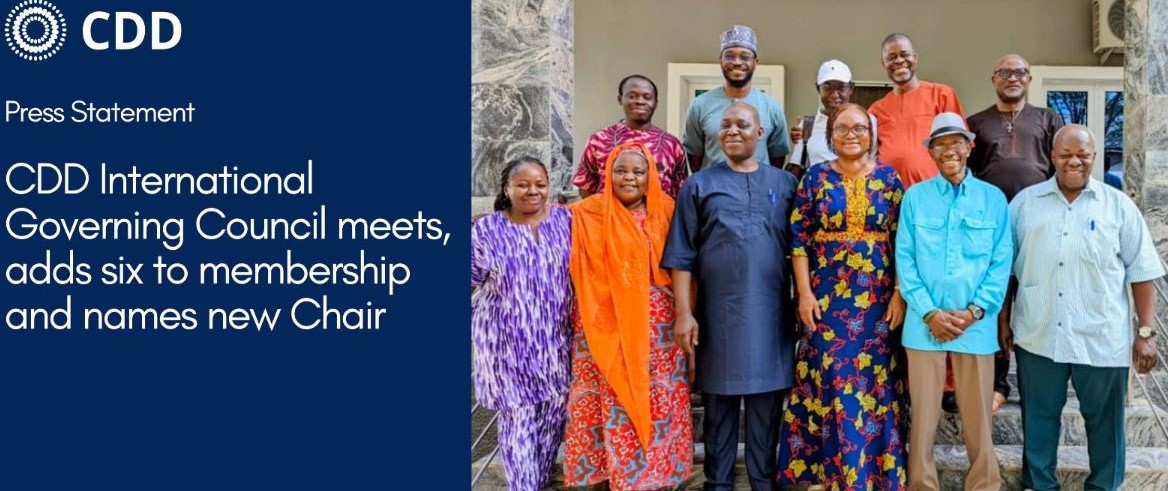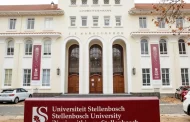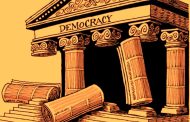The Centre for Democracy and Development – West Africa (CDD-WA) has formally announced the appointment of Cde John Odah as Chairman of its International Governing Council. The change comes along with the injection of five others into the International Governing Council structure. These are:
- Dayo Olaide, Segment Lead, International Foundations, World Vision Canada
- Sonny Onyegbula, Human Rights advisor with the United Nations
- Hauwa Biu, Professor of Curriculum and Instruction at the University of Maiduguri
- Moussa Tchangari Aissami Tata, Secretary-General of Alternative Espaces Citoyens, Niger
- Osagie Obayuwana, President of the Committee for the Defence of Human Rights, Nigeria
CDD said in a statement to the media that the individuals possess extensive experience and have steadfast dedication to its mission. Cde John Odah is the Executive Secretary of the Organisation of Trade Unions of West Africa (OTUWA)

Call it conservative or whatever, the CFRs takes power seriously. It shouts (through its journal), it trains, it frames, it networks and inducts!
The announcement of new helmspersons of a think tank in Africa with CDD’s aspirations cannot but be a big event conveying a ray of hope for a sub-region enmeshed in governance tension characterised by cost of living riots in its hegemon – Nigeria, democratic setback in another leading member country – Senegal and a spate of coups in four others that have already broken away from the regional organization – ECOWAS.
Think tanks do not exercise structural and coercive forms of power but they can make things happen through hegemony. As such, they set the conditions for the exercise of structural and coercive power and are, therefore, most worthwhile for people, countries and places in a quest for emancipation.
Notwithstanding the fluidity of agency in the unending clash of discourses and the ensuing modification of agency, it could be argued that the injection of six persons of diverse backgrounds speaks to a moment. Each of them is an activist’s activist, activism cutting across the students’ movement, human rights, gender, labour and pro-democracy activism of the 1980s to the dawn of civilian rule in 1999 and thereafter.
The inference about the new team speaking to a moment suggests nothing negative about the outgone management or board but a simple matter of expecting new brooms to energise the sweeping task. However, until the journalists begin to squeeze stuff out of the new helmsman, it may be difficult to know what agenda are privileged, notwithstanding the instructive stress on “a resolute dedication to advancing democratic principles, nurturing civic participation, and catalysing constructive transformations throughout West Africa” in the statement from CDD on what it calls a leadership transition.
With a management team headed by someone at home with recent debates in international development – the hub of much think tanking arising from a more critical and much broader conceptualisation of development in the post-Cold War – CDD’s optimism about “a prosperous and inclusive future across the region” might mean an era of ontological fireworks which has not been seen before. Which direction such fireworks go will remain a matter of speculation for now but it is possible the transition referred to in the statement from CDD might be a more far – reaching critique of think tanking practices in the region, particularly the obsession with orthodoxy and foundationalism.
If this is reading too much to CDD’s self-understanding as a “research, advocacy, and capacity building organization”, it cannot be to its reference to rigorous engagement within at some point in the statement to “retooling CDD to better respond to contemporary challenges pertaining to democratic governance, transparency, and sustainable development”
A CDD – WA turn to more critical think tanking is perhaps what has been long over-due. Such a turn would no longer amount to ‘úndue radicalism’ because, epistemic justice, for instance, has come to be seen by both the Left and the Right as the condition for global peace and security in the emerging world order. That is why global civil society in general and think tanks in particular are putting so much into it since the methodological revolt for pluralism in the US in 2000 to the great works on transnational actorness in the post-Cold War down to the ‘hegemony as (Socialist) strategy’ argument.
The puzzle is why these currents are stronger outside than inside Africa even as the ‘Áfrican condition’ is what most of the currents are fighting to repudiate. And might the world be waiting for CDD to reset it all?




























